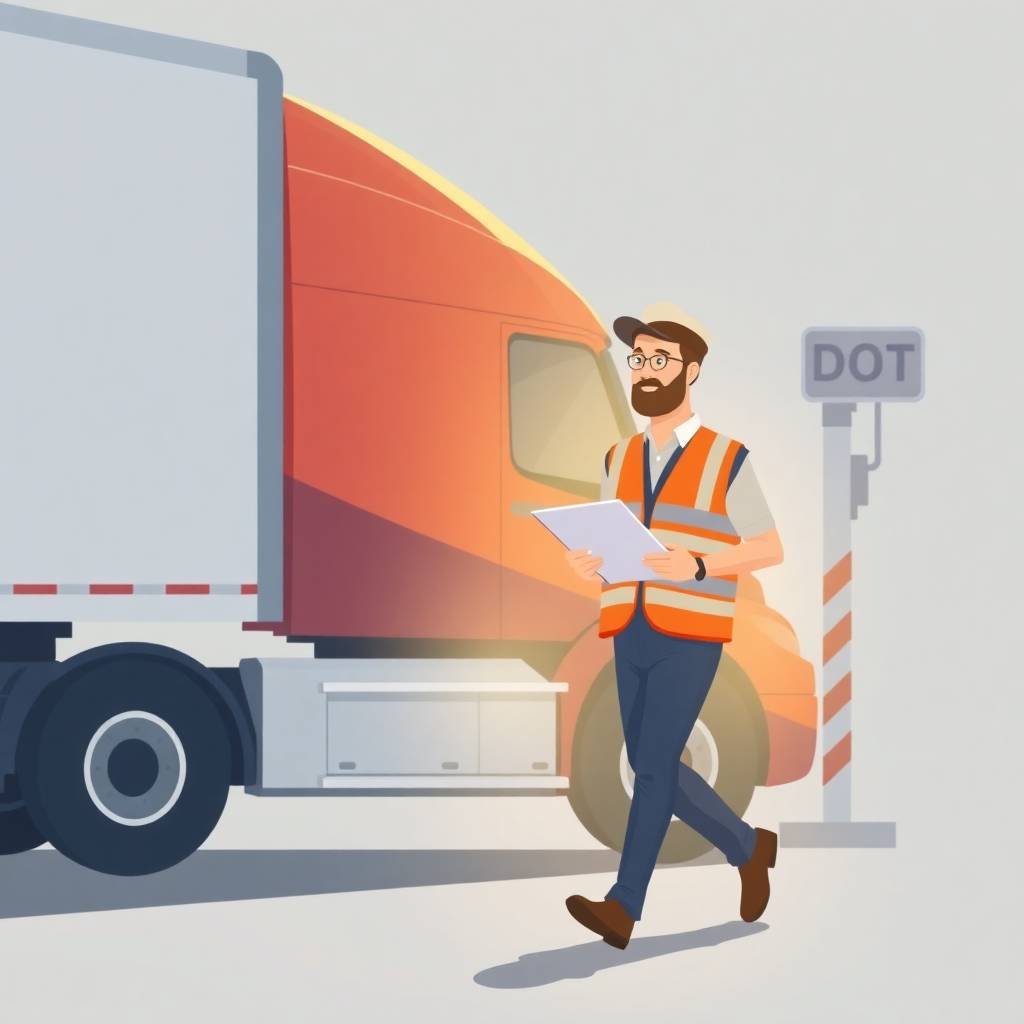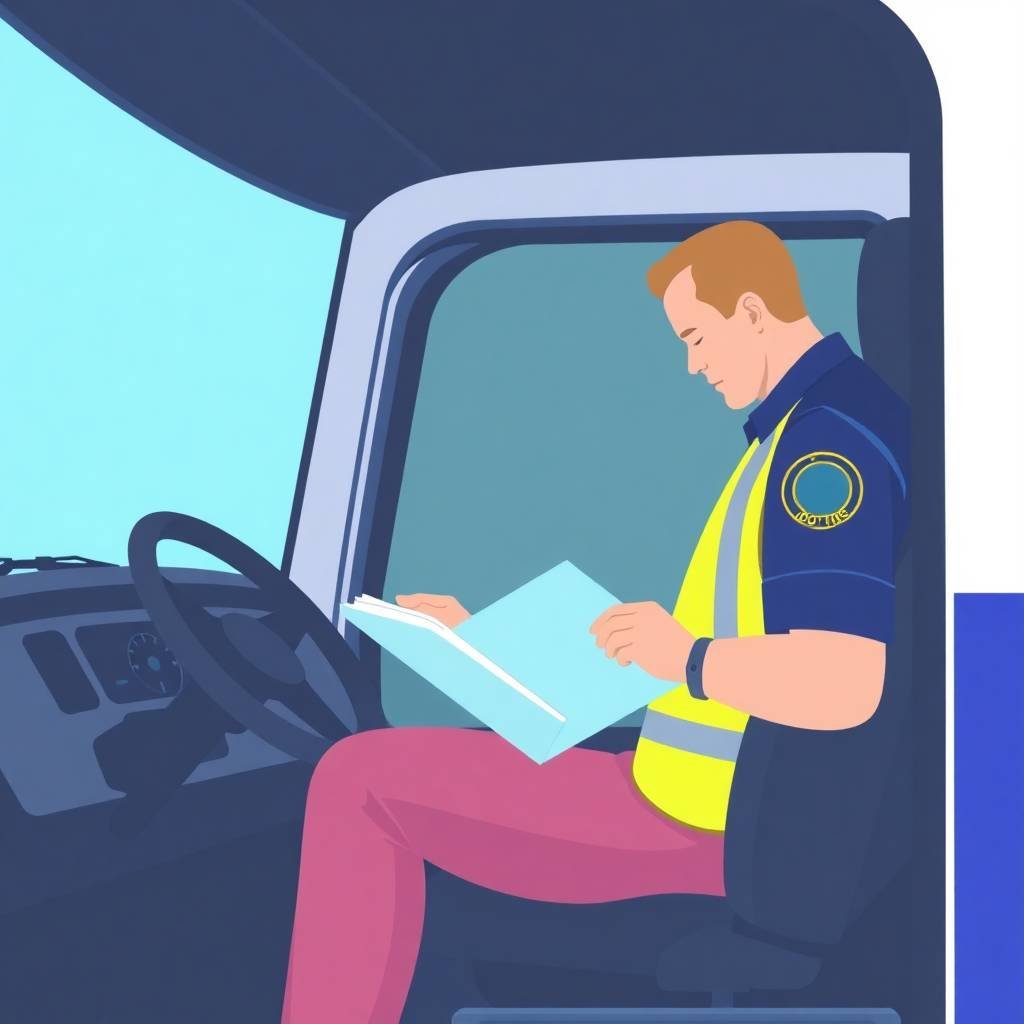1. Missing the Deadline: A Costly Oversight
Staying compliant with FMCSA Biennial Update Requirements isn’t just about following regulations—it’s about protecting your authority, avoiding steep fines, and ensuring smooth operations. Missing the deadline for this essential update can lead to severe consequences that affect everything from your USDOT number status to your overall safety score.
Why FMCSA Biennial Update Requirements Matter
Every carrier with a USDOT number is required by the Federal Motor Carrier Safety Administration to file a biennial update using the MCS-150 form. These FMCSA Biennial Update Requirements apply whether or not your company has changed any information. Failure to comply could lead to deactivation of your USDOT number and monetary penalties.
For an overview of related regulatory duties, visit Transportation.gov and FMCSA.gov. If you’re unsure about your status, now is the time to take action before your oversight becomes costly.
The Real Cost of Missing Your Update
Non-compliance with FMCSA Biennial Update Requirements can result in fines of up to $1,000 per day, capped at $10,000. But the cost isn’t only financial—your safety rating, insurance eligibility, and operating authority may all be jeopardized. If you’ve already missed a deadline or received a notice, our how to correct FMCSA violations service can help get you back on track fast.
How to Stay Ahead of the Deadline
Knowing your due date is only part of the equation. You also need to ensure that all data submitted in your biennial update is accurate and aligned with your current business operations. Our DOT compliance checklist for owner-operators helps streamline the review process to make updates easier and error-free.
Implications for Broader Compliance
Failure to meet FMCSA Biennial Update Requirements often correlates with other compliance breakdowns, such as outdated DQ files, missed drug and alcohol testing procedures, and neglected audit preparation. These oversights can trigger a series of violations that snowball into major enforcement actions.
Explore our full range of support services, including driver safety score management, CSA intervention thresholds, and IFTA/IRP/BOC-3 support, all designed to keep your fleet compliant year-round.
Expert Guidance to Prevent Mistakes
Whether you’re a new entrant navigating your first biennial update or a seasoned carrier managing multiple vehicles, expert help can make all the difference. Schedule a consultation now through this link to avoid missteps and gain clarity on your obligations.
Explore More Resources and Best Practices
Avoiding compliance pitfalls goes beyond the biennial update. Our in-depth resources cover everything from pre-employment DOT drug testing to FMCSA safety measurement systems, random drug testing, and the FMCSA Clearinghouse.
For tailored help, visit our main hub at Truckers Compliance Hub and explore services like DOT audit preparation, UCR filing deadlines, and drug and alcohol testing management. Our dedicated compliance services for owner-operators ensure you meet every critical requirement.
Final Thoughts
Overlooking FMCSA Biennial Update Requirements can spiral into costly mistakes. With proper tools, expert guidance, and consistent oversight, you can prevent these issues entirely. Learn how to protect your company’s future with additional tips in our post on FMCSA compliance mistakes, and for broader industry insights, explore our compliance help for trucking companies.
Please refer to our Disclaimer and Terms of Service for details regarding the information shared.

2. Using Outdated Company Information
When it comes to regulatory compliance in the trucking industry, keeping your company’s information current is more than good practice—it’s a legal requirement. At the core of this obligation are the FMCSA Biennial Update Requirements, which ensure that all carriers maintain accurate records with the Federal Motor Carrier Safety Administration (FMCSA). Using outdated company information is a frequent but costly oversight that can lead to major compliance issues, hefty fines, and even operational shutdowns.
The Role of Accurate Information in FMCSA Biennial Update Requirements
Every two years, or more frequently if changes occur, carriers must update their MCS-150 form to comply with FMCSA Biennial Update Requirements. This includes updates to your address, phone number, ownership structure, the number of vehicles in operation, and more. Even if there are no changes, filing is still mandatory. Failing to do so risks deactivation of your USDOT number and significant penalties.
For more official details, the FMCSA website at FMCSA.gov and Transportation.gov provide guidance directly from the source.
Why Outdated Information Triggers Bigger Problems
Using outdated data affects more than just your FMCSA file—it can compromise your entire safety and compliance profile. For example, mismatched or old data can flag issues during DOT audits or trigger alerts within the FMCSA Safety Measurement System (SMS). It can also complicate DQ file monitoring and distort drug and alcohol testing compliance records.
Many carriers also overlook related requirements such as driver qualification file accuracy and pre-employment drug testing, both of which are affected when incorrect company details are on file.
Avoiding Costly Mistakes with Proactive Updates
To avoid these pitfalls, it’s essential to review and confirm your data well before your update deadline. Our DOT compliance checklist for owner-operators offers a streamlined method to evaluate the accuracy of your company’s records. In addition, our FMCSA compliance services for owner-operators can support you with personalized assistance to prevent common missteps.
If you’ve already made an error, don’t panic—our FMCSA violation correction service can help you amend inaccurate submissions quickly.
Linking Compliance Across the Board
It’s critical to understand that FMCSA Biennial Update Requirements are just one piece of your full compliance puzzle. Ensure alignment with your random drug testing program, driver drug and alcohol testing program, and Clearinghouse compliance.
We also recommend reviewing your standing with UCR filing, IFTA/IRP/BOC-3 support, and CSA intervention thresholds. Each of these areas is interconnected, and a slip in one can negatively impact the others.
Schedule Help Before It’s Too Late
Avoiding penalties begins with expert help. Schedule your personalized compliance review via our appointment link today to make sure you’re ahead of your biennial update deadline.
Explore More Compliance Tools and Insights
Visit our main hub at Truckers Compliance Hub to access articles on common FMCSA compliance mistakes, new entrant safety audit survival tips, and our comprehensive DOT audit preparation services. If you’re looking for targeted help, we offer services like driver safety score management and drug and alcohol testing management.
For more valuable information, be sure to visit our pages dedicated to FMCSA compliance help for trucking companies and compliance services for owner-operators.
Please review our Disclaimer and Terms of Service for additional legal information related to this content.

3. Assuming You’re Exempt: Know the Rules
One of the most common and costly compliance mistakes in the trucking industry is assuming you’re exempt from the FMCSA Biennial Update Requirements. Whether you’re a new entrant or a seasoned owner-operator, it’s vital to understand your responsibilities under federal regulations to avoid penalties, service disruptions, and USDOT number deactivation.
The Reality of FMCSA Biennial Update Requirements
The FMCSA Biennial Update Requirements apply to all motor carriers, including those who believe they’re no longer in operation or aren’t subject to safety regulations. Every two years, carriers must update their MCS-150 form—even if no information has changed. This requirement exists regardless of fleet size, business activity, or perceived exemption status. Visit FMCSA.gov and Transportation.gov for official government guidance.
Failing to meet this requirement can trigger severe consequences. Inaccurate assumptions around exemption lead to avoidable fines, enforcement actions, and data inconsistencies that can harm your safety score.
Common Misconceptions Around Exemption
Many carriers think that having inactive vehicles, minimal activity, or being intrastate-only removes them from the FMCSA Biennial Update Requirements. However, if you hold a USDOT number, you’re still expected to file your biennial update. These misunderstandings often lead to problems uncovered during DOT audits and CSA interventions.
To avoid similar pitfalls, review our detailed FMCSA compliance mistakes guide and download our DOT compliance checklist for a complete overview.
The Domino Effect of Noncompliance
Missing or delaying your biennial update impacts far more than your USDOT number. It can trigger issues with driver qualification files, DQ file violations, and drug and alcohol testing programs. It may also interfere with pre-employment and random testing requirements.
To maintain a compliant program, explore our drug and alcohol testing management services and stay aligned with the FMCSA Clearinghouse rules.
Assistance is Available—Don’t Go It Alone
Whether you’re unsure about your status or struggling with updates, professional support is essential. Book a compliance consultation here to assess your requirements and avoid making costly assumptions.
For guidance on how to correct FMCSA violations and meeting your UCR filing deadlines, visit our website. We also offer comprehensive DOT audit preparation and tools like our owner-operator compliance checklist.
Stay Informed and Stay Compliant
Compliance doesn’t end with filing a single form. Make sure you’re reviewing IFTA/IRP/BOC-3 requirements, preparing for new entrant safety audits, and maintaining your standing in the FMCSA Safety Measurement System.
Stay updated with our compliance articles and tools, including resources specifically for owner-operators and trucking companies.
For a deeper dive into regulatory requirements, consult our resources on FMCSA compliance services for owner-operators and our full-service offerings for trucking businesses.
Please review our Disclaimer and Terms of Service to understand the scope of the services and information we provide.
Understanding the FMCSA Biennial Update Requirements and knowing whether you are truly exempt is essential. Don’t guess—know the rules, protect your business, and stay compliant.

4. Overlooking UCR and MCS-150 Updates Together
In the world of trucking compliance, few oversights can be as damaging as neglecting both UCR registration and the FMCSA Biennial Update Requirements. While they may seem like separate obligations, failing to manage these simultaneously can result in compounded penalties, a suspended USDOT number, and increased risk of audits or intervention from regulatory agencies.
Understanding the FMCSA Biennial Update Requirements
The FMCSA Biennial Update Requirements mandate that every motor carrier holding a USDOT number must update their MCS-150 form at least once every two years, even if no changes have occurred. This critical update is essential for maintaining accurate safety and operational data with the Federal Motor Carrier Safety Administration (FMCSA).
Ignoring the FMCSA Biennial Update Requirements can lead to the deactivation of your USDOT number and non-compliance penalties, as outlined by Transportation.gov. Even companies not actively operating are required to comply.
The Cost of Overlooking UCR Filings
UCR (Unified Carrier Registration) is another essential annual requirement. Carriers who operate in interstate commerce must register and pay fees based on fleet size. Failing to file your UCR on time—especially alongside a missed biennial update—creates a double hit to your compliance status.
Together, these oversights affect not just regulatory standing but also your visibility in the FMCSA Safety Measurement System (SMS), which can result in poor safety scores and higher risk ratings.
Compounded Compliance Risks
Overlooking the FMCSA Biennial Update Requirements and UCR simultaneously often leads to ripple effects. These include DQ file violations, delayed driver qualification file submissions, and failures during DOT audits.
Failing to meet either requirement also impacts areas like drug and alcohol testing compliance, FMCSA Clearinghouse adherence, and pre-employment drug testing protocols. These are crucial to maintaining a compliant driver drug and alcohol testing program.
To avoid such issues, consider using our professional drug and alcohol testing management or how to correct FMCSA violations services.
Stay Ahead with Professional Support
If you’re unsure whether your company has met all of its obligations under the FMCSA Biennial Update Requirements, don’t leave it to chance. Use our DOT compliance checklist or schedule a consultation via this link to stay compliant.
Owner-operators should especially review our compliance checklist for owner-operators and new entrant safety audit tips to prepare for potential audits.
Access the Right Resources
Browse our latest posts for updates on regulations and best practices. You can also explore our full suite of FMCSA compliance services for trucking companies and owner-operators.
Additional services include:
Before getting started, please review our Disclaimer and Terms of Service.
Maintaining compliance with the FMCSA Biennial Update Requirements and UCR is not just about avoiding penalties—it’s about protecting your business, drivers, and long-term reputation in the industry.

5. Incorrect USDOT PIN Usage
Incorrect usage of your USDOT PIN might seem like a small clerical error, but for motor carriers, it can become a serious compliance issue—especially when it interferes with meeting FMCSA Biennial Update Requirements. Every carrier must ensure they’re using their PIN correctly when updating MCS-150 data, submitting filings, or managing regulatory obligations with the Federal Motor Carrier Safety Administration (FMCSA). Missteps with your PIN can delay updates, impact your safety records, and trigger penalties.
Why the USDOT PIN Matters
Your USDOT PIN is your gateway to managing key filings required by FMCSA. When filing your MCS-150 form as part of the FMCSA Biennial Update Requirements, an incorrect PIN submission may cause the update to fail—leading to inaccurate data on your record or even a suspended USDOT number.
Motor carriers must complete the MCS-150 at least once every 24 months, even if no operational changes have occurred. This requirement is part of maintaining FMCSA compliance and can be verified directly via Transportation.gov. Failure to meet the FMCSA Biennial Update Requirements due to PIN issues can lead to enforcement action and affect your FMCSA Safety Measurement System (SMS) scores.
Common PIN Mistakes
Many carriers accidentally use an expired, incorrect, or mismatched PIN when attempting to file updates. Others may use the wrong login altogether, which results in filing delays or inaccurate submissions. These small errors can snowball, particularly when they coincide with other compliance gaps, such as DQ file violations or missed DOT audit preparation.
Carriers who operate under the assumption that PIN issues are minor often find themselves flagged during audits. That’s why having a trusted partner to manage these tasks is critical. You can explore our DOT audit preparation and compliance checklist services for support.
Staying on Top of FMCSA Biennial Update Requirements
To ensure compliance with the FMCSA Biennial Update Requirements, make sure your USDOT PIN is correct and valid before initiating updates. Also, review your standing on FMCSA Clearinghouse compliance, drug and alcohol testing, and driver qualification files. These areas are interconnected and often reviewed together by regulators.
For guidance on how to correct FMCSA violations, including those caused by PIN misuse or missed deadlines, our expert team is available. You can schedule an appointment to receive one-on-one assistance.
Resources to Support Your Compliance
Explore the Truckers Compliance Hub for the latest insights, including topics like random DOT drug testing requirements, pre-employment testing, and driver safety score management.
Owner-operators can benefit from our compliance checklist for owner-operators and new entrant safety audit tips. Additional services include support for IFTA, IRP, and BOC-3, CSA intervention thresholds, and drug and alcohol testing program management.
For a full overview, visit our resources for FMCSA compliance help and FMCSA services for owner-operators. Before using any of our services, please review our Disclaimer and Terms of Service.
Avoid letting an incorrect USDOT PIN disrupt your compliance. Staying ahead of the FMCSA Biennial Update Requirements protects your operations and ensures your records remain in good standing.

6. Not Verifying Submission Confirmation
When it comes to maintaining DOT compliance, one of the most common and costly mistakes motor carriers make is not verifying submission confirmation after completing forms like the MCS-150. Overlooking this crucial step can result in non-compliance with FMCSA Biennial Update Requirements, which may lead to enforcement actions, suspended USDOT numbers, or inaccurate safety data.
The Importance of Submission Verification
Each time you submit your MCS-150 to meet FMCSA Biennial Update Requirements, you should receive a confirmation page or email validating the successful submission. Without this verification, there’s no guarantee the update was received or processed by the Federal Motor Carrier Safety Administration (FMCSA). Missing this step is a simple error that can escalate into a significant compliance issue.
These updates are mandated every 24 months—even if no changes have occurred. According to Transportation.gov, failure to comply can result in deactivation of your USDOT number or penalties. To avoid this, always double-check that your submission was successfully completed.
Common Mistakes After Submission
Too often, carriers assume they’ve completed their FMCSA Biennial Update Requirements just by clicking “submit.” However, if your session times out, you enter incorrect USDOT PIN credentials, or fail to generate a confirmation number, the submission may not go through.
This oversight can lead to broader compliance failures. Your company’s Safety Measurement System data may reflect outdated information, affecting CSA intervention thresholds and driver safety scores. It may also be cited during a DOT audit, especially if you already have issues like DQ file violations or problems with FMCSA Clearinghouse compliance.
How to Ensure Proper FMCSA Submissions
To fully comply with FMCSA Biennial Update Requirements, always retain your confirmation email or download the final confirmation page. Use trusted platforms like the Truckers Compliance Hub to track your submission history and deadlines. For additional support, consider our services for DOT compliance checklists, how to correct FMCSA violations, or UCR filing deadlines.
Need personal help verifying your FMCSA updates? Schedule an appointment with one of our compliance experts today.
Beyond Biennial Updates: A Holistic Compliance Approach
Maintaining compliance isn’t limited to biennial updates. It includes drug and alcohol testing management, driver qualification file requirements, and IFTA/IRP/BOC-3 support. New carriers must also prepare for new entrant safety audits and monitor changes in FMCSA compliance requirements.
Whether you’re reviewing your pre-employment testing requirements or managing a random testing program, confirming all submissions and staying organized is critical.
For more in-depth guidance, visit our pages on FMCSA compliance help or our FMCSA compliance services for owner-operators.
To learn more about our terms, please review our Disclaimer and Terms of Service.
Avoid unnecessary risks—verifying your submissions is an easy step that ensures you meet all FMCSA Biennial Update Requirements and keep your operation running smoothly.

7. Ignoring Help and Resources
In today’s regulated trucking industry, ignoring available help and resources can be a costly mistake—especially when it comes to meeting FMCSA Biennial Update Requirements. Whether you’re a new carrier or a seasoned owner-operator, overlooking guidance and expert support often leads to critical compliance violations, unnecessary penalties, and even the suspension of your USDOT number.
Why FMCSA Biennial Update Requirements Matter
The FMCSA Biennial Update Requirements mandate that all carriers must update their MCS-150 form every 24 months. Even if nothing changes in your operation, you must still submit your update to the Federal Motor Carrier Safety Administration (FMCSA) to remain compliant. Failure to do so may result in deactivation of your USDOT number and enforcement actions that can shut down your operations.
At Truckers Compliance Hub, we consistently see carriers fall into this trap because they didn’t seek support, overlooked resources, or assumed compliance was a one-time process.
Consequences of Going It Alone
Many motor carriers underestimate the complexity of compliance. From DQ file violations to issues with drug and alcohol testing compliance, errors quickly stack up. Ignoring assistance on how to meet FMCSA Biennial Update Requirements often causes problems that show up during DOT audits or inspections.
For example, random DOT drug testing requirements and driver qualification file requirements are often misunderstood. These are just a few areas where expert guidance is critical to avoid fines and intervention.
Where to Find the Right Help
There are many trustworthy sources to help you meet FMCSA Biennial Update Requirements and stay compliant. Start by visiting the Department of Transportation or Truckers Compliance Hub to explore DOT compliance checklists and actionable resources.
We also offer a full range of services including:
- DOT compliance checklist for owner-operators
- Drug and alcohol testing management
- UCR filing deadlines
- CSA intervention thresholds
- IFTA, IRP, and BOC-3 support
For additional help, schedule your free consultation with our compliance experts to ensure you’re on the right track.
Build a Habit of Compliance
To build long-term success, you must consistently verify all submissions and avoid common FMCSA compliance mistakes. Leverage our insights on the FMCSA Safety Measurement System (SMS) and prepare for new entrant safety audits before they become an issue.
We’ve compiled extensive FMCSA compliance help for trucking companies and services tailored for owner-operators to ensure you’re covered.
Final Thoughts
Failing to take advantage of resources is not just inefficient—it’s risky. With support from trusted professionals, staying on top of your FMCSA Biennial Update Requirements becomes far more manageable. For guidance on correcting violations, visit how to correct FMCSA violations, and explore our resources on pre-employment testing and driver drug and alcohol programs.
For legal use and compliance, review our Disclaimer and Terms of Service.
Ignoring help is a mistake you don’t have to make. Use the tools and guidance available and keep your trucking business fully compliant with all FMCSA Biennial Update Requirements.

What happens if I miss the FMCSA Biennial Update deadline?

If you fail to file the FMCSA Biennial Update Requirements on time, your USDOT number may be deactivated, and you could face fines of up to $1,000 per day. To avoid enforcement action and maintain compliance, it’s essential to file by your deadline. If you’re unsure where to start, our DOT audit preparation services can guide you through the process and help you stay proactive.
How can I confirm if my company needs to comply with FMCSA Biennial Update Requirements?

All entities registered with a USDOT number — whether active or inactive — must comply with FMCSA Biennial Update Requirements every two years, regardless of changes to your information. If you’re unsure of your status, UCR filing assistance can help verify your obligations and ensure your filings align with FMCSA regulations.
What information is required when completing the FMCSA Biennial Update?

To complete the FMCSA Biennial Update Requirements, you’ll need to provide accurate and up-to-date details, including your company’s legal name, address, contact information, number of vehicles, and types of cargo transported. Errors in any of this data can result in compliance issues. For help managing these records effectively, our DQ file setup and monitoring service ensures your information remains current and audit-ready.
Do I still need to update if there have been no changes to my business information?

Yes, even if no changes have occurred, you are still required to comply with the FMCSA Biennial Update Requirements by submitting the MCS-150 form every two years. This is a regulatory obligation for all DOT-registered carriers. If you’d like a compliance partner to streamline this recurring process, our IFTA, IRP & BOC-3 support provides hands-on help to reduce your administrative burden.
Can incorrect FMCSA Biennial Update filings impact my drug and alcohol testing compliance?

Absolutely. Inaccurate or outdated information in your FMCSA Biennial Update Requirements can lead to compliance flags that may trigger audits, including reviews of your drug and alcohol testing program. To ensure alignment between your update filings and testing compliance, explore our drug and alcohol testing management services, which are designed to keep every aspect of your operation in sync.
Igor Iturriaga is a transportation compliance expert and founder of Dynamic 305 Miami LLC. He helps owner-operators and fleets stay FMCSA-compliant and audit-ready. https://www.linkedin.com/in/igor-iturriaga-64503217/
